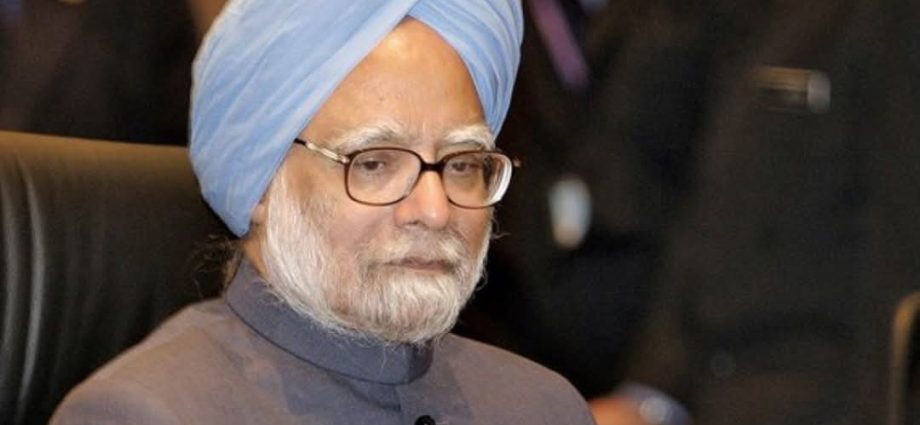By Jose Kavi
New Delhi, Dec 26, 2024: Manmohan Singh, who pulled India from the brink of bankruptcy and made it one of the fastest growing economies in the world, died on December 26 in New Delhi.
Singh, the 13th prime minister of India, died at 9:45 pm in All India Institute of Medical Sciences where he was admitted earlier in the day. He was 92.
Prime Minister Narendra Modi led the nation in mourning Singh’s death. Taking to X, the prime minister said: “India mourns the loss of one of its most distinguished leaders, Dr. Manmohan Singh Ji. Rising from humble origins, he rose to become a respected economist. He served in various government positions as well, including as Finance Minister, leaving a strong imprint on our economic policy over the years. His interventions in Parliament were also insightful. As our Prime Minister, he made extensive efforts to improve people’s lives.”
Federal Home Minister Amit Shah noted that Singh had played an important role in the governance of the country.
“The news of the demise of former Prime Minister Dr Manmohan Singh is extremely sad. From being the Governor of the Reserve Bank of India to the Finance Minister of the country and as the Prime Minister, Dr Manmohan Singh played an important role in the governance of the country. I express my condolences to his family and supporters in this hour of grief. May Waheguru grant peace to his soul and give strength to his family to bear this grief,” Shah said in a post on X.
Leader of Opposition Rahul Gandhi paid his tributes by writing: “Manmohan Singh Ji led India with immense wisdom and integrity. His humility and deep understanding of economics inspired the nation. My heartfelt condolences to Mrs. Kaur and the family. I have lost a mentor and guide. Millions of us who admired him will remember him with the utmost pride.”
Archbishop Andrews Thazhath of Trichur, head of the Catholic Church in India, hailed Singh as a renowned economist who played a pivotal role in shaping India’s economic policies.
“His contributions to the country’s growth and development are immeasurable. Moreover, his commitment to the well-being of minority communities is a testament to his dedication to social justice and equality,” said a condolence message from the president of the Catholic Bishops’ Conference of India.
The prelate expressed deep sadness over Singh’s passing away and extended his “heartfelt condolences” to the family and loved ones of the former prime minister.
“We pray that his legacy continues to inspire future generations to work towards a more just and equitable society. May his soul rest in peace. May God grant comfort and solace to his family during this difficult time.”
Capuchin Father Suresh Mathew, former editor of the Indian Currents weekly, said Singh’s term as the prime minister was characterized by his commitment to inclusive growth, social justice, and strengthening India’s position on the global stage.
“His government implemented several landmark initiatives, including the Right to Information Act, the National Rural Employment Guarantee Act, and the Right to Education Act,” he added.
Singh, who was the finance minister in the then Prime Minister PV Narasimha Rao-led government during 1991-1996, was hailed as a key architect of the economic reforms, breaking the stranglehold of socialist-era policies.
He changed the course of India’s economic trajectory, by ushering in an era of economic liberalisation.
Singh served as India’s prime minister for ten years from 2004. He was the fourth longest-serving prime minister after Jawaharlal Nehru, Indira Gandhi and Narendra Modi.
Singh was the first Sikh prime minister of India.
His political career ended in April when he retired from the Rajya Sabha, the upper house of parliament.
Singh had been a member of the Rajya Sabha since 1991, where he was leader of the opposition between 1998 and 2004.
Singh was born to Gurmukh Singh Kohli and Amrit Kaul on September 26, 1932, at Gah in West Punjab, now in Pakistan. His mother died when he was young and was raised by his paternal grandmother.
His family migrated to India during its partition in 1947. After obtaining his doctorate in economics from Oxford, Singh worked for the United Nations during 1966–1969. He subsequently began his bureaucratic career when Lalit Narayan Mishra hired him as an advisor in the Ministry of Commerce and Industry.
During the 1970s and 1980s, Singh held several key posts in the Government of India, such as Chief Economic Advisor (1972–1976), governor of the Reserve Bank (1982–1985) and head of the Planning Commission (1985–1987).












It was Dr Manmohan Singh who as the then prime minister introduced Pre-Matric (classes 1-10) and Post-Matric Scholarship (class 11 to post graduation, including professional/technical education namely chartered accountancy, medicine, civil services, judicial service, management, etc from government-recognised institutions) for meritorious students from minority communities (Muslims, Christians, Sikhs, Buddhists, Jains and Parsis. This was a well-thought out endeavour for `inclusive social development’ much before this term became a buzz-phrase. The objective of these scholarship schemes was to award scholarships to meritorious students belonging to economically weaker sections of minority community so as to provide them better opportunities for higher education, increase their rate of attainment in higher education and enhance their employability. At present, this scholarship scheme has been considerably curtailed. For example, Pre-Matric Scholarship from classes 1-8 and Post-Matric Scholarship for M.Phil & Ph.D. (Maulana Azad National Fellowship) – MANF fellowship scheme, which carried a monthly grant of up to Rs 25,000 for PhD and MPhil students from minority communities, has been discontinued since December 2022.
Read more at: https://www.deccanherald.com/india/govt-discontinued-maulana-azad-fellowship-as-it-overlaps-other-schemes-1187342.html
May the soul of Manmohan Singh rest in peace!
Tussi great Ji